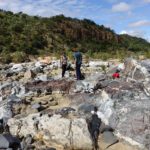Curtin University researchers are working on ways to drill mineral exploration boreholes at a fraction of the cost and time of industry standards.
Currently, the cost of drilling in hard rock environments means it’s often economically prohibitive to explore new ground, and it takes weeks to receive analysis of the ground minerals.
Professor Brian Evans, Department of Petroleum Engineering, who leads the project at Curtin University, believes that by modifying existing techniques, they will be able to drill boreholes at a cost of $50/m, with only two staff instead of six.
“Coiled tube drilling rigs have been used in the oil and gas industry for the last 40 years to clean up existing boreholes and they are quick because they are continuously drilling – they don’t need rod changes,” Professor Evans said.
“We are adapting these coiled tube drilling rigs to be used for hard-rock mineral drilling by replacing the steel drill pipe with flexible coiled tubing, and working on embedding sensors and electronic chips in the composite laminate tube, so logging can be done in real time.
“We’ve also decreased the borehole size, because by drilling continuously with small, low-cost impregnated diamond bits and increasing the speed, we are hoping to increase the rate of penetration substantially.”
The project, which is a partnership with CSIRO, The University of Adelaide, and various mining and service companies through Deep Exploration Technologies Cooperative Research Centre (DETCRC), aims to increase the drilling speed for mineral exploration from 50 rev/min to 7000 rev/min, while reducing costs and improving health and safety.
The first trial with the prototype drilling rig was publicly demonstrated in Brukunga quarry in Adelaide last week. Further testing is planned before the drill can be made commercially viable for industry use.



